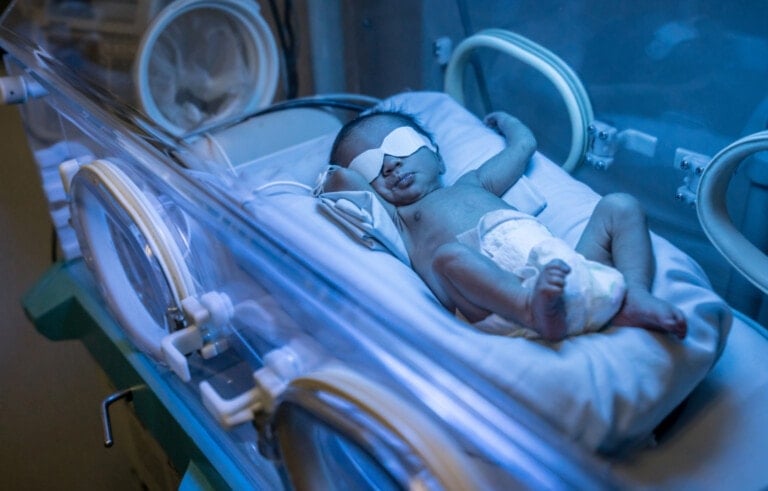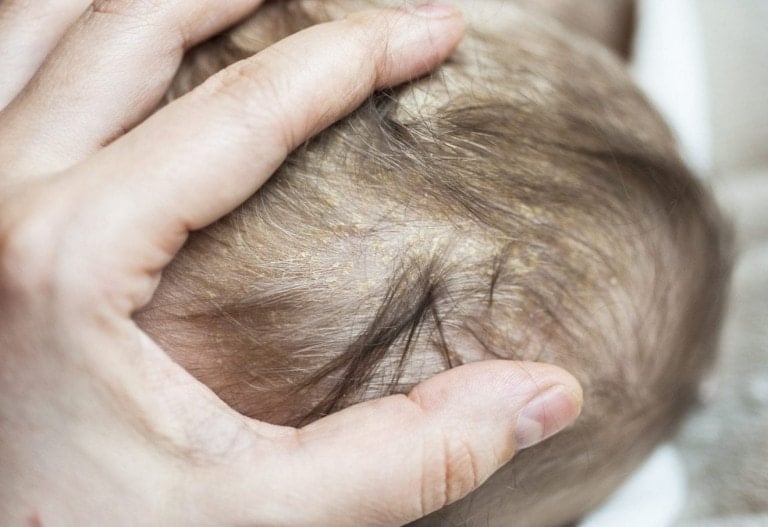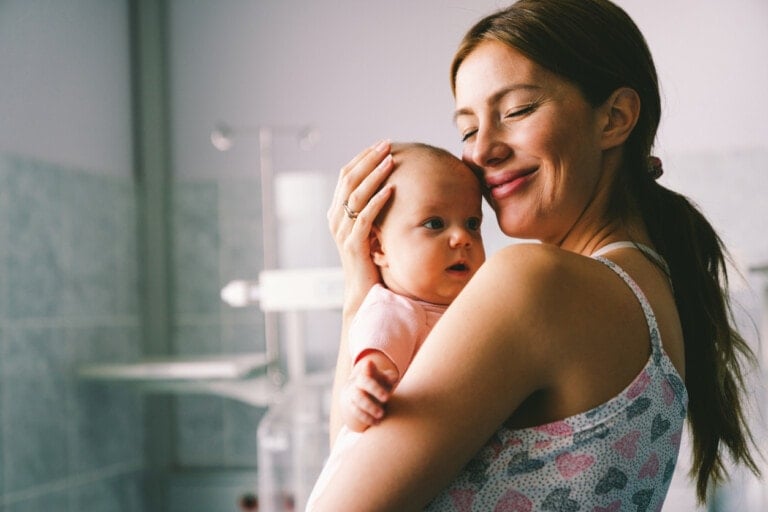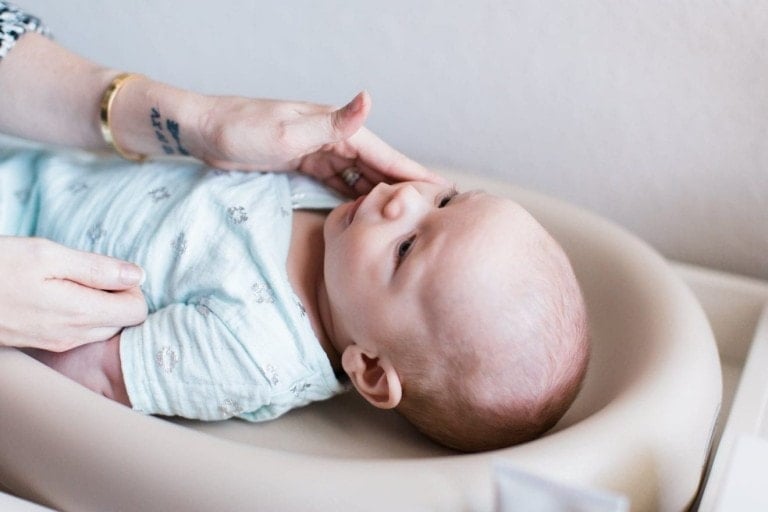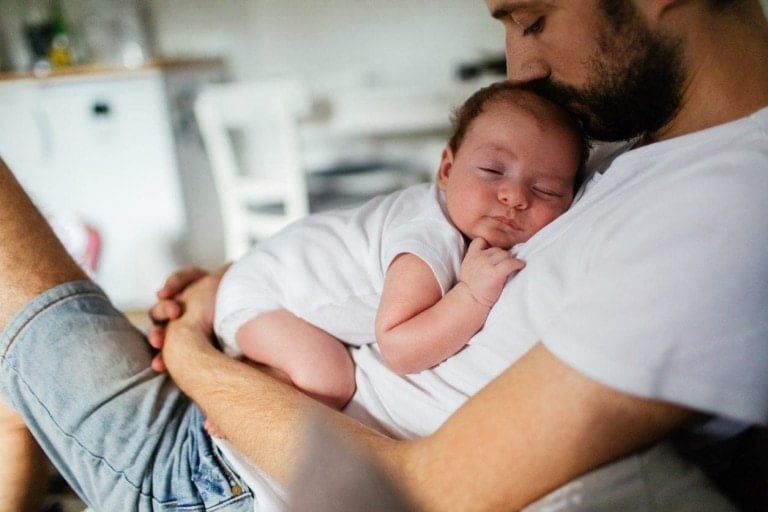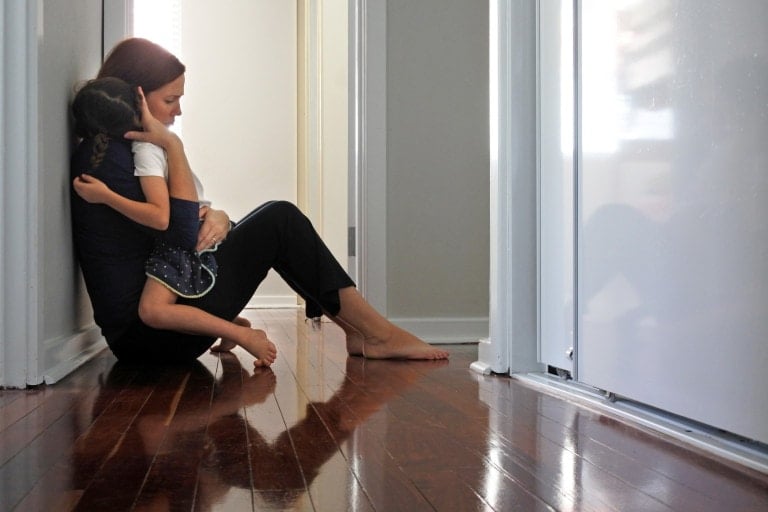New parents have a lot to take in. Once their baby is born, their lives change, from daily routines and household dynamics to their overall lifestyle. Tossing in a constant overload of information from physicians, loved ones, books, the internet, and social media can feel overwhelming.
As moms and dads navigate their new roles, it can be tough to discern truth from myth. We break down some of these myths about babies to help you determine which ones you can completely ignore.
20 Myths About Babies
1. Burp Your Baby After Feeding to Avoid Fussiness
False: If veteran parents scold you for not burping your baby, turn to science to back up your claims because this is a myth. A 2014 study on burped versus non-burped babies found that they did not have fewer crying instances compared to their non-burped counterparts. These burped babies were also twice as likely to spit up.1
While a burp may help a fussy baby, there are other reasons for gas buildup. For instance, a bottle-fed baby may have swallowed too much air and be fussy due to pent-up gas in their belly.2
2. A Pacifier is Bad for Breastfeeding
False: No matter if you introduce pacifiers to babies at birth or within two weeks, using a pacifier does not affect breastfeeding consistency and duration. The American Academy of Pediatrics also found a decreased risk of sudden infant death syndrome (SIDS) in babies who use a pacifier at bedtime.3,4
3. Babies Cannot See
False: While a newborn’s vision is not the best, the notion that babies can’t see is a myth. According to the American Optometric Association, babies can’t differentiate contrast at birth as they cannot move their eyes between two objects. At this point, they are best at focusing on things eight to 10 inches from their face.5
Within the first months, a baby’s eyes will start to work together, and their vision will improve. This is where eye-hand coordination develops, and their eyes can track movements followed by a reach with their hands. Their eyes can focus on a parent’s face or nearby people. If you feel that your baby’s vision is impaired, it’s best to consult your pediatrician.5
4. Babies Cannot Hear
False: Despite common misconceptions, infants can hear as far back as when they were in the womb! The ears form about five weeks after conception, and while a baby’s responses to external sounds are delayed, they can hear them. One study found that babies will only begin to respond consistently to external sounds at 20 to 22 weeks. A fetus can discern various voices and distinct syllables in the later stages of pregnancy.6
At birth, a baby can readily identify their mom’s voice, mom’s native language, and music that was listened to in the last 10 weeks of pregnancy.7
5. You’ll Spoil Your Baby If You Pick Them Up When They Cry
False: Many newbie parents almost always hear that ignoring a baby’s cry is okay and sometimes needed. But will it do more harm than good? J. Kevin Nugent, a child psychologist, and director of the Brazelton Institute at Children’s Hospital in Boston, believes you’re meeting your child’s needs when responding to their cues. A baby cries approximately three hours a day in the first three months because there is no other form of communication. These cries mean they are hungry, tired, lonely, or uncomfortable.29
Dr. Barbara Howard, assistant professor of pediatrics at Johns Hopkins University, terms a spoiled child as one who cries as a form of manipulation, which babies have not learned until about month nine.29
6. Baby’s First Smiles are Not Related to Gas
False: We hate to break it to you, mom and dad, but those newborn smiles are from farts. Babies smile in the first two months in response to an internal cue, such as gas. It’s not until the end of the second month that a baby begins smiling socially. And a social smile is different than one from gas because they may feel happy and loved when someone smiles at them, and then they start to return the smile.8
7. Breastfeeding Moms Can Only Eat Bland Food
False: According to the Children’s Hospital of Philadelphia, a mother’s body knows the nutrition a baby needs at each developmental stage. A mother’s breast milk will naturally alter its nutritional composition for the baby.9
However, nursing mommas should avoid certain foods and drinks, like alcohol and caffeine. Additionally, breastfeeding mothers should take caution when eating fish containing high levels of mercury, spicy or gas-producing foods, and common allergy foods like dairy or nuts. If a baby is experiencing abnormal symptoms, you may want to evaluate your diet and eliminate some foods.
8. Newborns Should Stay Inside
False: Of course, this depends on the outing you have in mind. Medical experts recommend avoiding crowded places until the baby is a few months old. That does not mean you can’t take your baby outside for a stroll and fresh air, but they should be dressed appropriately for the weather. When it is time for your bundle of joy to meet family and friends, ensure that people wash their hands before holding, touching, or feeding your newborn.10
9. Add Rice Cereal to Their Bedtime Bottle to Sleep Longer
False: A study of 106 infants looked at babies who were given cereal at bedtime versus babies who were not. Researchers found no significant trend or a consistent tendency of one group over the other to have a higher proportion of sleep. However, neither the AAP nor CDC recommends feeding your baby rice cereal as it may increase the risk of choking.11,12,13
10. Babies Should Be Given Water
False: Babies under six months should not drink water because it can make them unwell and deplete their nutritional needs. Giving a baby water or mixing too much water into their formula can equate to a smaller consumption of breast milk or formula. Once your little one is six months old, you can add a small quantity of water to their diet. Only after 12 months should a baby start drinking water.28
11. Babies are Born with the Same Amount of Bones That Adults Have
False: As adults, we have 206 bones that give us the body’s structure, allow our movements, protect our organs, and more. At birth, a newborn has 300 bones. It may sound bizarre, but a baby’s bones are made entirely from cartilage. This cartilage is soft and flexible, and as the baby grows, the cartilage fuses and becomes bones.14
12. You Will Fall in Love with Your Baby Instantly
False: It’s easy to think that the birth of your baby will bring you an immense connection and bond. Yet, this isn’t the case for everyone. Some moms experience the “baby blues,” which can bring on distress, anxiety, and sadness, while others can suffer from postpartum depression, which also interferes with bonding.15
13. Teething Can Cause a Fever
False: If your baby’s little bunnies have started to show and they’re running a fever, it’s likely a sign that they’ve got a cold rather than it being a result of them teething. Teething can raise your baby’s body temperature slightly, but if it surpasses 100.4 degrees, you may need medical intervention. Teething symptoms typically include fussiness, crankiness, drooling, and bouts of crying.22
14. Babies Have Kneecaps
False: Babies technically do not have kneecaps; however, they are born with pieces of cartilage that eventually become the bony kneecap.23
15. Babies Need a Bath Daily
False: Cross bathing your baby daily off your to-do list because this is also a myth. Newborns have sensitive skin containing a protective layer, natural oils, and normal healthy bacteria. If over-bathed with soaps or cleansers, little ones can experience dry, itchy, and irritated skin.24
The best way to perform a daily bath is with warm water at bedtime and a washcloth. For parents who prefer to use baby shampoo and soap, choose fragrance-free options that keep your infant’s skin supple and irritation-free. Consider washing your newborn no more than three times a week.25
16. Listening to Classical Music Raises a Baby’s IQ
False: While it would be fantastic if music could make your baby smarter, this statement is a myth. Coined the “Mozart Effect,” a 1999 study looked at college students and found an increase in abstract reasoning after listening to Mozart’s music. Unfortunately, the analysis proved this effect was only a temporary boost.16
To help boost your baby’s intelligence, turn to books, foods with healthy fats that encourage brain development, and developmental toys.
17. Babies Need to Poop Once a Day
False: Every baby has a different frequency for how often they poop. Don’t become dismayed if your baby is pooping less than you think, as some poop every two to three days. There is a higher frequency of poop in breastfed infants versus formula-fed infants.17
18. Being Cold Makes Babies Sick
False: Exposure to cold weather does not equate to catching a cold since that requires exposure to a virus. Precautions should be taken, however, by dressing your baby accordingly. If your infant is feeling under the weather, it’s best to keep them indoors to avoid the cold weather from exacerbating symptoms.26,27
19. Walkers are Great for Babies
False: The AAP is working to ban the sale of baby walkers, as Canada has already done, since they’re a hazard. A recent study looked at U.S. emergency department visits of children 15 months of age or less, where more than 230,000 were walker-related. Walkers are also known for delaying the learning-to-walk process since their learning is solely based on support from the ability to pull, stand, and balance themselves to take steps.18,19
20. Newborns are Bottom-heavy
False: A quarter of a baby’s weight comes from its head, which also takes up one-quarter to one-third of its total body length. A baby’s head also grows the fastest during the first four months due to rapid brain growth, making it an essential milestone for sitting up and supporting its head.20,21
The next time you get advice about your baby from a family member or close friend, remember that it’s best to take it lightly and research to confirm if it’s valid since it could be a myth. If you’re still uncertain, talk to your physician, who can better inform you of your baby’s well-being.





















